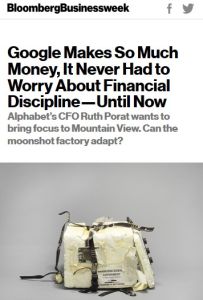
Max Chafkin and Mark Bergen
Google Makes So Much Money, It Never Had to Worry About Financial Discipline – Until Now
Alphabet’s CFO Ruth Porat wants to bring focus to Mountain View. Can the moonshot factory adapt?
Bloomberg Businessweek , 2016
What's inside?
Will Google’s recent shift toward stricter fiscal control blunt its innovative edge?
Recommendation
Can risk-taking innovation coexist with fiscal responsibility? In their detailed article, Bloomberg Businessweek reporters Max Chafkin and Mark Bergen explore this question by examining the reasons behind Google’s recent reorganization into Alphabet, and the fallout from that shift. With the change in structure, a company with a historical lack of internal financial strictures has found itself grappling with the question of how to balance financial discipline with the pursuit of risky creative projects. getAbstract recommends this article to everyone interested in Google, Alphabet and tech innovations.
Take-Aways
- Historically, Google’s strong advertising revenue allowed its engineers to pursue highly ambitious “moonshot” innovations with little financial oversight.
- Prior to becoming Alphabet in October 2015, Google had an informal structure that led to “overlaps” and negative press for the company when moonshots like Google Glass didn’t perform as expected.
- The corporate reorganization created a collection of “standalone companies” separate from Google itself.
- Alphabet still spent more money on moonshots in the third quarter of 2016 than in the same 2015 period.
- Going forward, moonshot projects must prove their financial viability.
Summary
Over the course of 2016, Google’s parent company Alphabet lost a number of project leaders in its research department Google X, now more simply known as X. Some view this development as the result of increased regulation of research projects which came with “Alphabetization” – that is, reorganizing Google into a collection of “standalone companies.” Does the outflow of innovators indicate a problem with how the company now approaches its highly ambitious innovation projects called “moonshots”? Put another way, will a more cautious approach to spending blunt X’s creative edge?
“Over the 12 months ended in September [2016], Google’s ad business accounted for 89% of Alphabet’s revenue, or $76.1 billion. As one ex-executive puts it, ‘No one wants to face the reality that this is an advertising company with a bunch of hobbies.’”
For most companies, asking that risky projects “show a path to profit” wouldn’t raise eyebrows. But Alphabet isn’t typical. When Google went public in 2004, its founders warned investors of its intent to eschew a “short-term profitability” strategy. “Do not be surprised,” the founders noted, “if we place smaller bets in areas that seem very speculative or even strange.” Solid advertising revenues made this approach possible, and, historically, the company allowed its engineers to pursue moonshots with little financial oversight. This freedom allowed creativity to flourish, but the informal structure also led to “overlaps” and botched communication: The prelaunch hype around Google Glass, for example, made its eventual failure seem worse. According to the head of X, Astro Teller, Glass was supposed to be experimental; it was not intended to be seen as a “finished product.” Clearly, that message didn’t penetrate.
“During the third quarter of 2016, Alphabet spent $3.6 billion on research and development – an enormous amount of money and 11% percent more than Alphabet’s R&D outlay in the same period in 2015.”
Although Teller previously had been pushing for a more business-minded approach to X, with Alphabetization this shift became solidified. The new chief financial officer, Ruth Porat, ushered in “rigorous budgeting” and made cuts to a number of X projects. With Alphabetization, too, came increased clarity with regard to how much money Google’s ad business generated and how much cash X and other business divisions lost. More controls and tighter financial oversight notwithstanding, Teller believes that Google continues to draw innovative engineers because of the scope of its research projects. In spite of the shift toward project profitability and the criticism that came with it, Alphabet continues to increase its investment in moonshots.
About the Authors
Max Chafkin writes for Bloomberg Businessweek and Bloomberg Technology. Mark Bergen is a reporter covering Google and Alphabet at Bloomberg.
This document is restricted to personal use only.
My Highlights
Did you like this summary?
Read the articleThis summary has been shared with you by getAbstract.
We find, rate and summarize relevant knowledge to help people make better decisions in business and in their private lives.
Already a customer? Log in here.




















Comment on this summary